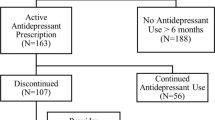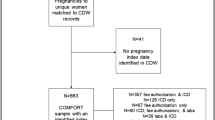Abstract
Depression screening is recommended for all pregnant veterans; however, little is known on how often symptomatic women receive care, how depression treatment presents in practice, and whether women veterans are utilizing treatment during the appreciable perinatal period. Our sample included 142 pregnant veterans from 15 Veterans Health Administration (VA) medical facilities with Edinburgh Postnatal Depression Scale (EPDS) scores ≥10. Sociodemographic characteristics, military service, health utilization, and pregnancy related factors were collected as part of a telephone survey. A majority of our sample (70%) had 1 or more mental health visits or antidepressant prescriptions during pregnancy. Women with a history of depression had more mental health visits and a higher percentage of antidepressant use before and during pregnancy than women without a history of depression. Pregnant women veterans without a history of depression may be less likely to receive care for depression during pregnancy. However, the majority of our veterans showing depression symptoms prenatally had at least one mental health visit or an antidepressant medication fill during their pregnancy window, suggesting that mental health care is readily available for women veterans.



Similar content being viewed by others
References
Mattocks KM, Skanderson M, Goulet JL, et al. Pregnancy and mental health among women veterans returning from Iraq and Afghanistan. J Women's Health. 2010;19(12):2159–66. https://doi.org/10.1089/jwh.2009.1892.
Shivakumar G, Anderson EH, Surís AM. Managing posttraumatic stress disorder and major depression in women veterans during the perinatal period. J Women's Health. 2015;24:18–22.
Kroll-Desrosiers, AR, Crawford SL, Moore Simas, TA, Clark, MA, Bastian, LA, & Mattocks, K. M. Rates and Correlates of Depression Symptoms in a Sample of Pregnant Veterans Receiving Veterans Health Administration Care. Womens Health Issues. 2019;29(4):333–40. https://doi.org/10.1016/j.whi.2019.04.008.
Moore Simas TA, Flynn MP, Kroll-Desrosiers AR, et al. A systematic review of integrated care interventions addressing perinatal depression care in ambulatory obstetric care settings. Clin Obstet Gynecol. 2018;61(3):573–90. https://doi.org/10.1097/GRF.0000000000000360.
Department of Veterans Affairs (2012) VHA Handbook 1330.03, Maternity Health Care and Coordination.
West AN, Lee PW. Associations between childbirth and women veterans’ VA and non-VA hospitalizations for major diagnostic categories. Mil Med. 2013;178:1250–5.
Byatt N, Biebel K, Lundquist RS, et al. Patient, provider, and system-level barriers and facilitators to addressing perinatal depression. J Reprod Infant Psychol. 2012;30(5):436–449. https://doi.org/10.1080/02646838.2012.743000.
Hofmann SG, Asnaani A, Vonk IJJ, Sawyer AT, Fang A. The efficacy of cognitive behavioral therapy: a review of Meta- analyses. Cognit Ther Res. 2012;36:427–40.
Vigod SN, Wilson CA, Howard LM. Depression in pregnancy. BMJ. 2016;352:i1547.
Byatt N, Moore Simas TA, Lundquist RS, Johnson J V., Ziedonis DM. Strategies for improving perinatal depression treatment in North American outpatient obstetric settings. J Psychosom Obstet Gynecol. 2012;33(4):143–61. https://doi.org/10.3109/0167482X.2012.728649.
Alwan S, Reefhuis J, Rasmussen SA, Friedman JM. Patterns of antidepressant medication use among pregnant women in a United States population. J Clin Pharmacol. 2011;51:264–70.
Yamamoto A, McCormick MC, Burris HH. Disparities in antidepressant use in pregnancy. J Perinatol. 2015;35:246–51.
Cooper WO, Willy ME, Pont SJ, Ray WA (2007) Increasing use of antidepressants in pregnancy. Am J Obstet Gynecol 196:544.e1-544.e5.
Schwarz EB, Brandt C, Borrero S, Zephyrin LC, Bathulapalli H, Haskell S. Counseling of female veterans about risks of medication-induced birth defects. J Gen Intern Med. 2013;28(Suppl 2):S598–603.
Yonkers KA, Wisner KL, Stewart DE, Oberlander TF, Dell DL, Stotland N, et al. The management of depression during pregnancy: a report from the American Psychiatric Association and the American College of Obstetricians and Gynecologists. Obstet Gynecol. 2009;114:703–13.
Field T. Postpartum depression effects on early interactions, parenting, and safety practices: a review. Infant Behav Dev. 2010;33:1–6.
Miller LJ. Postpartum depression. JAMA. 2002;287:762–5.
Department of Veterans Affairs; Department of Defense (2016) VA/DoD clinical practice guideline for the management of major depressive disorder clinician guideline summary qualifying statements.
American College of Obstetricians and Gynecologists (2012) Depression (FAQ106).
Byatt N, Levin LL, Ziedonis D, Moore Simas TA, Allison J. Enhancing participation in depression Care in Outpatient Perinatal Care Settings: a systematic review. Obstet Gynecol. 2015;126(5):1048–58. https://doi.org/10.1097/AOG.0000000000001067.
Mattocks KM, Baldor R, Bean-Mayberry B, Cucciare M, Gerber MR, Goldstein, KM, et al. Factors Impacting Perceived Access to Early Prenatal Care among Pregnant Veterans Enrolled in the Department of Veterans Affairs. Womens Health Issues, 2019;29(1):56–63. https://doi.org/10.1016/j.whi.2018.10.001.
Harris PA, Taylor R, Thielke R, Payne J, Gonzalez N, Conde JG. Research electronic data capture (REDCap)--a metadata-driven methodology and workflow process for providing translational research informatics support. J Biomed Inform. 2009;42:377–81.
Department of Veterans Affairs (2014) 172VA10P2: VHA Corporate Data Warehouse-VA. 79 FR 4377. Austin
Skanderson M, Bastian LA, Brandt CA, Haskell S, Kerns RD. Receipt of prescription opioids in a National Sample of pregnant veterans receiving veterans health administration care. Womens Health Issues. 2015;26(2):240–6. https://doi.org/10.1016/j.whi.2015.09.010.
Babb JA, Nephew BC, Guilarte-Walker Y, Deligiannidis KM. Association of peripartum synthetic oxytocin administration and depressive and anxiety disorders within the first postpartum year. Depress Anxiety. 2017;34:137–46. https://doi.org/10.1002/da.22599.
Department of Veterans Affairs (2013) VHA Directive 1731: Decision Support System Outpatient Identifiers.
Flynn HA, Blow FC, Marcus SM. Rates and predictors of depression treatment among pregnant women in hospital-affiliated obstetrics practices. Gen Hosp Psychiatry. 2006;28:289–95.
Cox JL, Holden JM, Sagovsky R. Detection of postnatal depression. Development of the 10-item Edinburgh postnatal depression scale. Br J Psychiatry. 1987;150:782–6.
Bergink V, Kooistra L, Lambregtse-van den Berg MP, Wijnen H, Bunevicius R, van Baar A, et al. Validation of the Edinburgh depression scale during pregnancy. J Psychosom Res. 2011;70:385–9.
Matthey S, Henshaw C, Elliott S, Barnett B. Variability in use of cut-off scores and formats on the Edinburgh postnatal depression scale - Implications for clinical and research practice. Arch Womens Ment Health. 2006;9:309–15.
Kimerling R, Gima K, Smith MW, Street A, Frayne S. The veterans health administration and military sexual trauma. Am J Public Health. 2007;97:2160–6.
Frayne SM, Phibbs CS, Friedman SA, et al (2012) Sourcebook: women veterans in the veterans health administration. Volume 2. Sociodemographics and use of VHA and non-VA care (fee). Washington DC.
Smith JA, Osborn M (2008) Interpretative phenomenological analysis. In: Smith JA (ed) Qual. Psychol. A Pract. Guid. To res. Methods, second. SAGE publications, London, pp 53–80.
Creswell JW. Qualitative inquiry and research design: choosing among five approaches. Thousand Oaks: SAGE Publications; 2007.
Colaizzi PF. Psychological research as the phenomenologist views it. In: Valle RS, Mark K, editors. Existent. New York: Phenomenol. Altern. Psychol. Oxford University Press; 1978. p. 48–71.
Mattocks KM, Haskell SG, Krebs EE, Justice AC, Yano EM, Brandt C. Women at war: understanding how women veterans cope with combat and military sexual trauma. Soc Sci Med. 2012;74(4):537–45. https://doi.org/10.1016/j.socscimed.2011.10.039.
Bennett IM, Marcus SC, Palmer SC, Coyne JC. Pregnancy-related discontinuation of antidepressants and depression care visits among Medicaid recipients. Psychiatr Serv. 2010;61:386–91.
Wisner KL, Sit DKY, McShea MC, Rizzo DM, Zoretich RA, Hughes CL, et al. Onset timing, thoughts of self-harm, and diagnoses in postpartum women with screen-positive depression findings. JAMA Psychiat. 2013;70:490–8.
Katon JG, Lewis L, Hercinovic S, McNab A, Fortney J, Rose SM. Improving perinatal mental health Care for Women Veterans: description of a quality improvement program. Matern Child Health J. 2017;21:1598–605.
Lynch MM, Squiers LB, Kosa KM, et al. Making decisions about medication use during pregnancy: Implications for communication strategies. Matern Child Health J. 2017;22:92–100.
Weinreb L, Byatt N, Moore Simas T, Tenner K, Savageau J. What happens to mental health treatment during pregnancy? Women’s experience with prescribing providers. Psychiatr Q. 2014;85(3):349–55. https://doi.org/10.1007/s11126-014-9293-7.
Santucci AK, Gold MA, Akers AY, Borrero S, Schwarz EB. Women’s perspectives on counseling about risks for medication-induced birth defects. Birth Defects Res Part A - Clin Mol Teratol. 2010;88:64–9.
Lynch MM, Amoozegar JB, McClure EM, Squiers LB, Broussard CS, Lind JN, et al. Improving safe use of medications during pregnancy: the roles of patients, physicians, and pharmacists. Qual Health Res. 2017;27:2071–80.
Bennett HA, Boon HS, Romans SE, Grootendorst P. Becoming the best mom that I can: Women’s experiences of managing depression during pregnancy - a qualitative study. BMC Womens Health. 2007;7:1–14.
Lupton D. ‘Precious cargo’: foetal subjects, risk and reproductive citizenship. Crit Public Health. 2012;22:329–40.
Hammer RP, Burton-Jeangros C. Tensions around risks in pregnancy: a typology of women’s experiences of surveillance medicine. Soc Sci Med. 2013;93:55–63.
Haskell SG, Goulet JL, Krebs EE, Skanderson M, Leslie D, Justice AC, et al. The burden of illness in the first year home: do male and female VA users differ in health conditions and healthcare utilization. Womens Health Issues. 2011;21:92–7.
Frayne SM, Phibbs CS, Saechao F, et al (2014) Sourcebook: women veterans in the veterans health administration. Volume 3: Sociodemographics, utilization, costs of care, and health profile. Washington DC.
US Preventive Services Task Force (2018) Draft Recommendation Statement: Perinatal Depression: Preventive Interventions. https://www.uspreventiveservicestaskforce.org/Page/Document/draft-recommendation-statement/perinatal-depression-preventive-interventions. Accessed 4 Sep 2018.
Acknowledgements
This material is based on work supported by the Department of Veterans Affairs, Veterans Health Administration, Office of Research and Development (HSR&D IIR13-81). All authors had full access to all of the data in the study and take responsibility for the integrity of the data and the accuracy of the data analysis. The views expressed in this article are those of the authors and do not reflect the position or policy of the Department of Veterans Affairs or the United States Government. The authors thank Laurel A. Copeland, PhD, for her assistance with the analysis.
Author information
Authors and Affiliations
Corresponding author
Ethics declarations
All procedures performed in studies involving human participants were in accordance with the ethical standards of the institutional and/or national research committee and with the 1964 Helsinki declaration and its later amendments or comparable ethical standards. This article does not contain any studies with animals performed by any of the authors.
Conflict of Interest
Dr. Moore Simas receives grant funding from the National Institute of Health (R41 MH113381) and the Centers for Disease Control and Prevention (U01DP006093) for projects related to perinatal depression. Dr. Moore Simas receives a stipend from the Massachusetts Department of Mental Health via Beacon for her role as Engagement Director of the Massachusetts Child Psychiatry Access Program for Moms (MCPAP for Moms). Dr. Moore Simas is Medical Director of Lifeline4Moms; she co-directs the American College of Obstetricians and Gynecologists’ Expert Work Group on Maternal Mental Health and was a member of the Council on Patient Safety in Women’s Health Care’s task force for creation of the maternal mental health patient safety bundle and co-author on the associated commentary. Dr. Moore Simas has served on ad hoc Physician Advisory Boards for Sage Therapeutics, has received speaking honoraria, and serves as a consultant on observational studies and a systematic review. Dr. Moore Simas serves as a consultant to Ovia Health, has received compensation for reviewing a perinatal depression case for McGraw Hill, and has received speaking honoraria from Miller Medical Communications. All other authors declare that they have no conflict of interest.
Additional information
Publisher’s Note
Springer Nature remains neutral with regard to jurisdictional claims in published maps and institutional affiliations.
Rights and permissions
About this article
Cite this article
Kroll-Desrosiers, A.R., Crawford, S.L., Moore Simas, T.A. et al. Treatment and Management of Depression Symptoms in Pregnant Veterans: Varying Experiences of Mental Health Care in the Prenatal Period. Psychiatr Q 91, 475–493 (2020). https://doi.org/10.1007/s11126-019-09676-7
Published:
Issue Date:
DOI: https://doi.org/10.1007/s11126-019-09676-7




